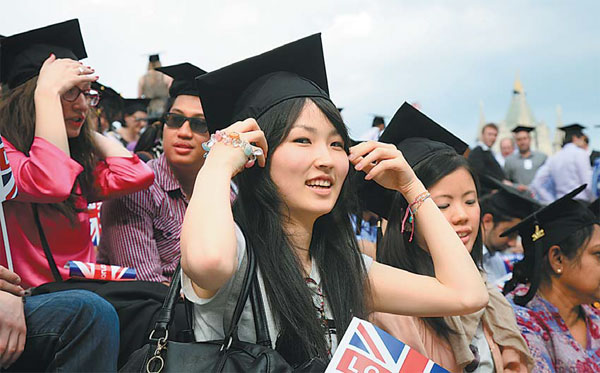Onward march of the Chinese sea turtles amid tough times
Updated: 2015-03-27 07:27
By Riazat Butt and Bu Han(China Daily Europe)
|
|||||||||||
Overseas experience can still bring benefits despite toughening labor market
Ni Wei says his life in the United Kingdom went by "like a flash". Ni, now a teacher in Beijing, studied international hospitality and tourism at Sheffield Hallam University between October 2012 and October 2013.
"It was my idea to study abroad. My parents never went to university."
|
Chinese students in London. China's labor market in recent years has been tough for new graduates, and experts say a degree from a foreign university does not guarantee a better job. Photos provided to China Daily |

Ni, now 27, had never traveled outside China. Although he obtained his bachelor's degree in China, he decided to go abroad for further study.
"A foreign degree doesn't mean very much now in China, but actually I believe it will somehow help in my future career."
He recommends overseas study to his friends, but urges them to "please make sure you've gained enough cooking skills" before going.
Meng Xianting, an architecture student at Delft University of Technology in the Netherlands, also thinks the most difficult part of overseas study is cooking.
On a more serious note, the 25-year-old from Beijing says: "I didn't go to university in China because I wanted to broaden my horizons. I didn't get a scholarship. My parents pay my tuition fees, about 13,000 euros ($13,800) for one year. Instead of considering it as investment for my future, I'd rather regard it as a special experience in my life. It has nothing to do with how much money I will earn after my graduation."
Professor Gu Qing, of Nottingham University's School of Education, says Chinese students are not just taking a piece of paper with them when they get on a plane home. "There is a change in identity. They value having seen a different side of the world. Being different becomes their strength. It becomes a treasure in their life. Some returnees say they have learned abilities that become clearer to them over time."
The professor, from Anhui province, did her master's and PhD in the UK. In her latest piece of research, published in March, she says most of the 650 people interviewed for the study found jobs despite some difficulties. "Sometimes it's a matter of time and sometimes it's a matter of adjusting expectations."
Chinese students have been nicknamed haigui (sea turtles). However, in recent years they have been more cruelly tagged haidai (seaweed). Gui can also mean return, and dai can also mean waiting.
What may help to distinguish them from their domestically educated peers are their competencies. Richie Lu, a senior consultant at EIC Group, which provides marketing, recruitment and support services to international universities, says: "Students with a foreign degree can be more creative. They will have critical thinking and teamwork skills."
Those with foreign professional experience or internships are also more attractive to employers, he says.
The labor market is tough in China, especially for those fresh out of school. About 15 million students need to find employment this year, a figure that includes 7.49 million college graduates and a similar number graduating from vocational, technical schools or middle schools, the minister of human resources and social security said in March.
Speaking on the sidelines of the National People's Congress annual session in Beijing, Yin Weimin said China faced the complex and arduous task of ensuring employment amid an economic slowdown.
"The large numbers in the new workforce will pose immense pressure (on the labor market) and there is also an acute structural imbalance," he said.
Jennifer Feng, chief human resources expert at 51job, China's biggest online recruitment agency, says: "There is no data supporting the idea that having a foreign degree gets you a better job than if you have a Chinese degree. If returnees don't have more knowledge, better skills or lower salary expectations, then employers are not likely to hire them."
The depreciation of a foreign degree is partly due to the rising number of overseas-educated graduates returning to China and a growing graduate population in general.
"Most of the foreign colleges and universities are unknown by employers, so employers don't think foreign degrees are better," Feng says.
"Another reason is that China has the largest customer base in the world, and most businesses don't need English. Few employers need staff who are highly educated English speakers."
There is a greater demand for workers in the manufacturing and service industries, Feng says, and most employers seeking recruits are small and medium-sized businesses, whereas graduates set their sights on state-owned enterprises, multinationals or large, private firms.
She gives the following advice to aspiring sea turtles: "Study overseas not for a degree, but for knowledge. Keep an eye on the Chinese economy and its talent needs. Look for internships and opt for short-term learning."
Duan Xiaofang, who is studying French civilization and culture at the University of Paul-Valery in Montpellier, southern France, has her own advice. "If you are not strong or independent enough in your heart to live alone, if you are not sure what it is you want exactly, if you don't have the determination to solve problems by yourself, maybe it's better to think twice about going abroad."
The 24-year-old, from Henan province, says: "My parents didn't go to university, and it is my first time outside China. I want to improve my French so I can get a better job when I finish my studies in 2017. My parents paid for my education, which wasn't expensive compared with English-speaking countries, and sure, I see a foreign degree as an investment.
"The best part of studying overseas is that it can help you live a totally different life, one you could never have imagined before. In other words, it can give you a second life. The hardest part is living alone and doing everything on your own."
It is living abroad, more than studying abroad, that has changed her, she says, especially when she encounters problems.
"The experience in France tells me that I should look to myself, rather than to others, for help. In other words, I am my own savior."
riazat@chinadaily.com.cn
(China Daily European Weekly 03/27/2015 page7)
Today's Top News
Voice recordings show one pilot locked out cockpit
Geely to invest $372m on new London Taxi facility
Netherlands' PM to meet with Xi
Italian vineyards see a glass that's half full in China
Moscow says US security strategy 'anti-Russia'
Cockpit voice recorder of crashed airliner found, probe under way
Queen approves new coin for birth of second baby of Prince William
House passes resolution urging Obama to send arms to Ukraine
Hot Topics
Lunar probe , China growth forecasts, Emission rules get tougher, China seen through 'colored lens', International board,
Editor's Picks

|

|

|

|

|

|






